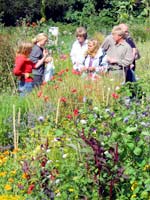Centre for Alternative Technology - Healthy Life Essex
Home » Articles » Sustainability » Centre for Alternative Technology


Would you, your school or your company like to know more about sustainable technology and ways of life that can help Britain achieve zero carbon? CAT offers fun, facts and stimulating ideas. It also covers various aspects of the school curriculum particularly in science, technology and geography for any level from infants to postgraduates. A visit to CAT in Wales can be great fun and certainly guaranteed to inspire.
The Centre for Alternative Technology (CAT) was founded in 1973 on the site of the disused Llwyngwern slate quarry near Machynlleth, in Mid Wales.
CAT’s founder Gerard Morgan-Grenville saw the potential of the site for “a project to show the nature of the problem and show ways of going forward.” The community of idealists and problem solvers who moved here were dedicated to environmental principals and to finding sustainable solutions to energy generation. At first it was a test bed for new ideas and technologies, an ethos that has continued all through CAT’s 35 year history.
Increasing numbers of interested people came to CAT, and many stayed as volunteers. As more workers arrived, they brought a wide range of skills and experience.
In 1974, The Duke of Edinburgh visited CAT. After his visit, some members of staff suggested turning part of the site into a Visitor Centre a permanent exhibition to explain CAT’s work and generate interest in alternative technology. It opened to the public in 1975.
Since then, CAT has grown to become Europe’s leading eco-centre. It is staffed by over 100 permanent staff and volunteers all year round. We receive around 65,000 visitors every year, who come to learn about our work.
Today CAT core aims are to inspire, enable and inform people to live more sustainable lives and reduce their impact on the planet in order to solve the greatest and most pressing challenge of our time; climate change.
CAT runs an extensive educational programme. The Graduate School for the Environment offers four different Masters courses, covering architecture, environment and energy studies and renewable energy.
Short courses of up to one week cover sustainable building, water management, gardening and ecology, woodland management and crafts, education and economics of sustainability and courses for installers of renewable technologies.

The education department run day visits, lectures and up to week long visits for school groups and university groups, covering curriculum areas such as science, geography and technology.
All the education course, from primary schools to installers and postgraduate have the opportunity to stay on site and experience first hand the technologies they are learning about.
Next year our newest building will open, the Wales Institute for Sustainable Education (WISE) will house the graduate school and provide state of the art facilities including a 200 seater rammed earth lecture theatre, space for 24 study bedrooms, break out rooms, biology and computer labs and restaurant.
The building is a unique opportunity to monitor and research energy use in buildings. All throughout the construction the energy embodied in the building has been carefully monitored and this will continue into its use to provide valuable data to improve construction and energy methods.

The building is constructed using the most sustainable methods and materials possible, the structure is timber frame and rammed earth. Limecrete and hempcrete is used instead of concrete, 500m of insulation, passive solar design, high thermal mass and natural lighting keep energy requirement low. 70 square metres of solar hot water panels and a 6.5 kw PV array meet the hot water and electricity requirements.
WISE will be an exemplar facility where students, business leaders, policy makers and householders can learn about sustainable living.

As well as the education programme, CAT is involved in many innovative projects. The 30 year update of our energy strategy was published last year. Zero Carbon Britain (www.zerocarbonbritain.com) responds to the seriousness of the climate science and instead of starting from a point of what is politically expedient it starts from what is scientifically necessary to tackle climate change and demonstrates how we can move to a zero carbon society in 20 years.
We are now starting the research process that will lead to Zero Carbon Britain 2. This will look deeper into the intricacies of how to achieve zero carbon, especially from an economic point of view.
This expansion of our policy work goes hand in hand with yet another huge, exciting and high profile project; we will be branching out with a series of cultural exchange lectures, tours and connections in Washington at the Smithsonian Folk Life festival. More information on the exciting programme for this will be available soon.
All of this work on top of our usual packed programme of courses, events, conferences and activities mean that 2009 will be an especially big year for CAT and we warmly invite you all to get involved.
Centre for Alternative Technology
www.cat.org.uk
Centre for Alternative Technology,
Machynlleth,
Powys,
SY20 9AZ,
UK
01654 705950
![]() Centre for Alternative Technology Charity Limited; a company limited by guarantee.
Centre for Alternative Technology Charity Limited; a company limited by guarantee.
Charity no. 265239; Company no. 1090006, registered in Wales.
Registered office: Llwyngwern, Machynlleth, Powys, SY20 9AZ.
